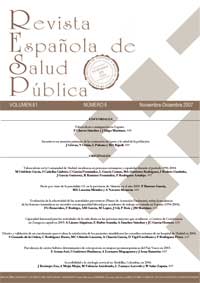Functional Capacity for Daily Living Activities among Senior Citizens Attending Community Centers in the City of Zaragoza, Spain, 2005
Abstract
Background: To study the dependence related to aging is of particular interest in Aragon, where the population is one of the most aged in Spain. The objective of this study is that of quantifying the degree of functional dependence for daily living activities (DLA) and identifying the personal traits related thereto among individuals age 65 and above who are living at home and attend Community Centers in the city of Zaragoza. Methods: Cross-sectional study with 380 individuals selected by two-stage sampling. The OARS-MFAQ questionnaire was used by way of personal interviews, analyzing questions which assess the functional capacity to carry out the DLAs and their scoring (dependent variable), sociodemographic variables, self-assessed health condition and actual and hypothetical informal help (independent variables). The chi-square was used for evaluating classified residual data (p<0.05) and multiple correspondence analyses. Results: A total of 9.6% of the subjects showed major/total dependence, this percentage increasing to 15.5% and 18.7% for those individuals above age 75 and 80, respectively. The minor/moderate dependence is related to being a female (p<0.01), health condition selfassessed as poor-passable (p<0.0001), being a widow(er) (p<0.01), having no elementary school education (p<0.01). Conclusions: Those individuals who are more elderly, females, widow/widowers, having a lesser degree of education and worse selfassessed health condition are more dependent. Practically one out of every ten non-institutionalized individuals 65 years of age or over shows a severe deterioration of their functional capacity. Extrapolating, nearly 11,000 individuals in the city of Zaragoza would require daily help for the DLAs or should stay institutionalized.Downloads
Published
2008-03-13
Issue
Section
ORIGINALS

